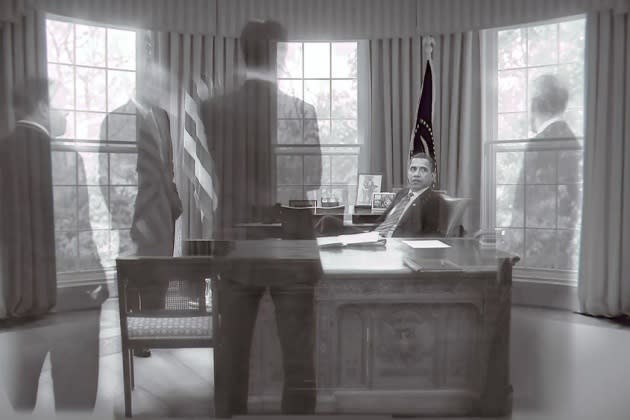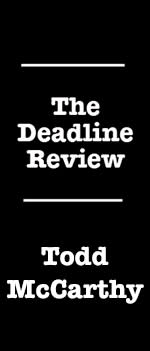Telluride Review: Dror Moreh’s Documentary ‘The Corridors Of Power’
- Oops!Something went wrong.Please try again later.
- Oops!Something went wrong.Please try again later.
- Oops!Something went wrong.Please try again later.
- Oops!Something went wrong.Please try again later.
- Oops!Something went wrong.Please try again later.

An exceptional and, one might venture, unprecedented group of politicians, diplomats, policy wonks, elected officials and veteran Washington insiders expound on the effectiveness of international military intervention—and the lack thereof—in The Corridors of Power. Israeli director Dror Moreh made one of the great political documentaries of recent times in The Gatekeepers (2012), as well as the excellent The Human Factor (2019), and this time he has assembled an all-star cast of more than 30 political heavyweights including Henry Kissinger, Hilary Clinton, George Shultz, Madeleine Albright and Condoleeza Rice, who in deep, original interviews, help to build a picture of how and why the best intentions can come unglued. The film deserves to be seen in any and all venues by audiences interested in the state of the world and clarity about how we got here.

Deadline
More from Deadline
“You will have to find a new enemy,” Chairman of the Joint Chiefs of Staff Colin Powell announced to anyone who was listening in 1989, when the Berlin Wall fell and the Soviet Union collapsed. The communist threat, which had endured for more than 70 years, was no more and the United States, then led by Ronald Reagan and soon thereafter by George Bush, stood as the uncontested top global power. For a moment it seemed there was no significant conflict that might disturb the long-sought goal of sustained international peace. A new world order appeared ordained.
Alas, there have officially been 78 wars around the world since 1990; we just don’t hear about most of them, as they are generally local and don’t achieve international headlines. The 10-years-long war in Afghanistan ended in 1989, but many others followed in short order, beginning with Iraq, and then Serbia, Rwanda, Somalia, et al. Even in the best of times, it’s the worst of times somewhere, and whenever anyone says “never again” after a deadly conflict, you know another one lurks somewhere in the world ready to explode.
The film doesn’t attempt to explain the dynamics behind this tragic but seemingly inevitable syndrome, nor does it propose an explanation for humans’ seemingly unquenchable need for confrontation and battle. But it does offer an utterly engrossing smorgasbord of insider views, informed analysis, historical perspective and political variables that cumulatively presents a depressing analysis of the human condition, one that all too persuasively suggests that conflict is the most elemental fact of life. The best of minds and the most compassionate of people can work for peace on a daily basis but still not be able to prevent further political bloodshed; prejudice, ego, opportunism and thirst for power seem to trump reason and let’s-just-get-along-ism on far too many occasions. Just for the most recent example, you need look no further than what Russia recently ignited.
Moreh has done an exceptional job in getting so many high-level figures to sit for lengthy, in-depth conversation about the hows and whys of international diplomacy and the difficulty of maintaining sustained peace in the world. What, a little over 30 years ago, might have been hoped for as the new world order quickly became the new world disorder.
“Ethnic cleansing” was one of the curses of the time, and there were dreadful massacres in Africa between the Tutsis and Hutus, which took at least a million lives. One of President George H.W. Bush’s final acts as president was to send troops into Somalia in December 1992; the Gulf War only lasted for six months, but the Iraq war went on for eight years. There are many more examples, just as there are arguments as to whether the U.S. should have intervened in just some or any of these conflicts.
The Corridors of Power provides a privileged opportunity to hear and assess the views of many of the key players from those years, as well as to examine the reasons why they acted as they did. Among those with the most screen-time is Samantha Power, who served on the National Security Council under Obama and was subsequently Ambassador to the UN for four years. As much as anyone in the film, she visibly wrestles with the pros and cons of intervention, the desire to do the right thing and save lives versus involving the country in yet another endless and, from many perspectives, futile mission. The ghastly footage of countless casualties in Croatia is the most vivid and emotionally upsetting of any in the film, but even in hindsight it’s difficult to say what the correct response is to something like this. Certainly, one of the film’s major conclusions is that it’s all but impossible to be the world’s chief policeman, but that still leaves the open question as to whether retaliatory action is not sometimes morally required.
When examined in such a concentrated way in this film, the sorry spectacle of ongoing slaughter, war-mongering and all-purpose misbehavior makes you ponder the whether the human race has learned anything at all since small tribes began quarreling and fighting with each other in pre-historic days. Certainly, we should have learned centuries ago that constant fighting is not the state we ought to permanently inhabit, but there seems to be no cure for it; sometimes we have no choice, but a quick glance at the day’s news is enough to prove that human nature hasn’t changed much at all.
The speakers Moreh has assembled here could scarcely be more expert or articulate, and yet you can see the exasperation and disappointment even in their reflections on history’s tragic inevitabilities. For the record, the many other insightful commentators are James Baker, Colin Powell, Leon Panetta, Paul Wolfowitz, Sandy Berger, Anthony Lake, Nancy Soderberg, Ben Rhodes, Denis McDonough, Michael Mullen, George Moose, Wesley Clark, Derek Chollet, Jaek Sullivan, Leon Fuerth, Anthony Blinken, John Shattuck, Prudence Bushnell, Peter Galbraith, Richard A. Clark, Wael Alzayat, Rob Malley, Laura Lane, Chuck Hagel, Stephen Sestanovich and James Collins.
Best of Deadline
NFL 2022 Schedule: Primetime TV Games, Thanksgiving Menu, Christmas Tripleheader & More
The Queen Onscreen: 15 Actresses (And Actors) Who've Played Elizabeth II In Film And On TV
'Blonde' Premiere Photo Gallery: Ana de Armas Channels Marilyn Monroe At Venice Film Festival
Sign up for Deadline's Newsletter. For the latest news, follow us on Facebook, Twitter, and Instagram.

